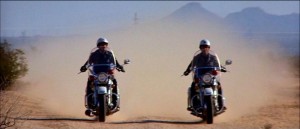In an anti-authoritarian age of Easy Riders, Billy Jacks and Serpicos, there weren’t a lot of films sympathetic to a man with a badge, but 1973’s Electra Glide in Blue was an exception. A none-too-subtle riposte to the seminal Hopper-Fonda motorcycle movie, director James William Guercio’s drama looks at various degrees of justice before speeding headlong into a paranoid nightmare of a conclusion.
John Wintergreen (Robert Blake) is an Arizona motorcycle cop who wants to trade the dusty desert highways for the respectability of a suit, a desk and a beat in Homicide. “Big John” is no bleeding heart—he isn’t asking for hand-outs and he isn’t offering an—but he doesn’t make arrests based on length of hair or width of bell bottoms. He may get his wish for career advancement when he happens upon an apparent suicide that doesn’t look so apparent after a little investigating. Trouble is, Detective Harve Poole (Mitchell Ryan), who is in charge of the case, twists love beads into nooses until he gets confessions, and he expects Wintergreen to behave in kind.
Even though Electra Glide in Blue was a low-budget affair and Guercio’s first (and only) feature, it isn’t a cheap-looking exploitation flick, thanks in good part to outstanding work by legendary cinematographer Conrad Hall. The film has some plot points that don’t really convince, but at its center is Blake in a perfectly restrained performance as a man with a code in a world that either can’t or won’t decipher it.•
· · ·

